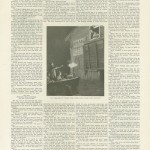
We simply have not synthesized from disparate studies a compelling alternative to popular perception. We historians collectively are partly to blame for this gap.

Nevertheless, the failure of National Prohibition continues to be cited without contradiction in debates over matters ranging from the proper scope of government action to specific issues such as control of other consciousness-altering drugs, smoking, and guns.

Repeal itself became possible in 1933 primarily because of a radically altered economic context-the Great Depression. Drinking habits underwent a drastic change during the Prohibition Era, and Prohibition’s flattening effect on per capita consumption continued long after Repeal, as did a substantial hard core of popular support for Prohibition’s return. As a result of 100 years of temperance agitation, the American cultural climate at the time Prohibition went into effect was deeply hostile to alcohol, and this antagonism manifested itself clearly through a wave of successful referenda on statewide prohibition.Īlthough organized crime flourished under its sway, Prohibition was not responsible for its appearance, as organized crime’s post-Repeal persistence has demonstrated. 1 A majority of New Zealand voters twice approved national prohibition but never got it. Furthermore, Americans were not alone during the first quarter of the 20th century in adopting prohibition on a large scale: other jurisdictions enacting similar measures included Iceland, Finland, Norway, both czarist Russia and the Soviet Union, Canadian provinces, and Canada’s federal government. Historians have shown, however, that National Prohibition was no fluke, but rather the fruit of a century-long series of temperance movements springing from deep roots in the American reform tradition. The conclusive proof of Prohibition’s failure is, of course, the fact that the Eighteenth Amendment became the only constitutional amendment to be repealed.

Liquor’s illegal status furnished the soil in which organized crime flourished. If the question arises why Americans adopted such a futile measure in the first place, the unnatural atmosphere of wartime is cited. “Everyone knows” that Prohibition failed because Americans did not stop drinking following ratification of the Eighteenth Amendment and passage of its enforcement legislation, the Volstead Act. PROBABLY FEW GAPS between scholarly knowledge and popular conventional wisdom are as wide as the one regarding National Prohibition.


 0 kommentar(er)
0 kommentar(er)
